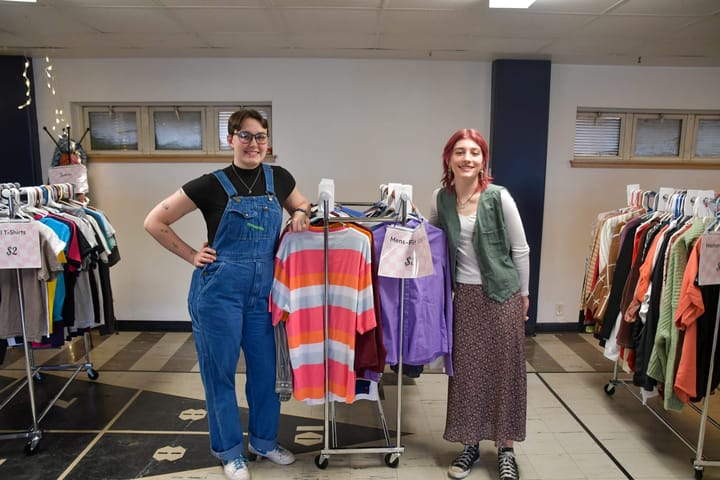Green, Metzel present on genetic engineering at Boe Forum
The 24th Boe Forum on Public Affairs—the first ever held virtually—featured two prominent geneticists, Dr. Robert Green and Dr. Jamie Metzl, who discussed the future of genetic sequencing and the ethical concerns and responsibilities that come with genetic progress in healthcare.
The event, titled “Are We Ready? The Science, Ethics, and Geopolitics of Genetic Engineering and Preventative Genetics,” was originally scheduled for March 2020 but was postponed due to the COVID-19 pandemic. The Boe Forum was presented as a YouTube livestream on Monday, March 15, at 7:30 p.m., with a peak audience of more than 580 viewers watching the event live.
Metzl spoke of the great possibilities — and subsequent great ethical dilemmas — that he believes the world is at the threshold of discovering with the science of genetics.
“After billions of years of evolution, our one species, of all species that have ever lived, we suddenly and increasingly have the ability to read, write and hack the genetic code of life,” Metzl said. “The question for us is ‘Will we have the wisdom to use these promethean technologies wisely?’ This is a conversation about science, about technology. But at its core, this is a conversation about ethics.”
Metzl said three fundamental transformations are coming as genetics progresses. Healthcare will transition from generalized care based on population averages to personalized healthcare based on sequenced genomes. Genetics will expand beyond healthcare and will be applied to thinking about how people exist within different spectrums. Finally, genetics will change the way people think about reproduction.
Metzl noted that these innovations come with the possibility of risk.
“This moment comes with a tremendous amount of danger,” Metzl said. “What role can we play to do our bit to make sure that these technologies are used in the wisest possible ways that enhance our communities rather than undermine it?”
Metzl also put genetics into the context of the ongoing pandemic. He said the speed and effectiveness of the COVID-19 vaccines points to the “magic of biotech and genetics revolutions.”
Green argued that there are three narratives that have kept genetic sequencing from general public health care: a narrative of catastrophic emotional distress, a narrative of genetic complexity that clinicians won’t be able to translate and a narrative of a threat to privacy and invitation to insurance discrimination.
To negate these fears, Green provided evidence that although emotional distress can occur, patients are less likely to react negatively when they find out their genetic information when they view it as unexceptional and a part of their day-to-day health. Green also said that by simplifying the human genome, clinicians can be trained to read the sequencing of several genes just like charts. Also, Green said there are federal laws in place to help protect against insurance discrimination.
There are four domains of information that can be learned from sequencing a genome, according to Green. First, monogenic dominant genes determine traits for individuals. Second, monogenic recessive genes can determine traits for an individual’s children. Third, pharmacogenetics helps physicians comprehensively prescribe drugs. And finally, polygenic risk scores are composed of thousands of markers that create a bell curve when computationally put together.
Green ended his remarks by speaking about health disparity and fears of a “genomic apartheid.” He said as of now, the majority of participants in genetic sequencing have European ancestry. Genetic data looks different when sequenced from non-European ancestries, Green said, stressing the importance of having a more diverse database.
“One of the things we’re going to focus on is trying to address the diversity problem in genomics,” Green said. “We have to do whatever’s necessary to collect the data from diverse populations.”
The Boe Forum concluded with the doctors responding to questions from Augustana journalism and biology students and genetic counseling graduate students. Moderated by President Stephanie Herseth Sandlin, Metzl and Green answered questions on equity in genetics, future risks, biohacking and regulation, preventative genetic policy and the ongoing investigation into the origins of the coronavirus.
Herseth Sandlin hosted the forum. She noted in her introduction that Augustana partnered with Sanford Imagenetics in 2016 to establish a master’s program in genetic counseling. At the time, the program was one of only 32 in the country.
Metzl is a senior fellow for technology and national security with the Atlantic Council and an appointee to the World Health Organization expert advisory committee. His latest book, “Hacking Darwin: Genetic Engineering and the Future of Humanity,” speaks to his specialty in making revolutionary science understandable to the general public, according to the university website.
Green, a physician-scientist and Harvard professor of medicine, is an internationally recognized leader in conducting research and has established the first family-oriented Preventative Genomics Clinic, according to the Augustana University website.



